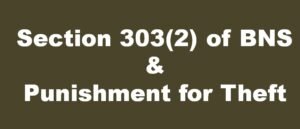303(2) BNS | Punishment for Theft | New Bail Provision ?
303(2) BNS
Section 303(2) BNS speaks about the punishment for the offence of Theft.
A person commits theft when they dishonestly take something from someone’s possession without their knowledge or consent.
Section 303(2) of BNS
The Section 303(2) of BNS (Bharatiya Nyaya Sanhita, 2023) is equal to Section 379 of Indian Penal Code (IPC).
It is pertinent to mention here that it would satisfy the definition of theft if the accused takes away any movable property out of the possession of another person though he intended to return it later on.
Punishment for 303(2) BNS
A person who commits theft receives imprisonment for up to three years, or a fine, or both.
If a person convicts a second or subsequent time under this section, the law imposes rigorous imprisonment for at least one year, which may extend up to five years, along with a fine.
Ingredients of 303(2) BNS
In order to constitute theft five factors are essential:
(1) Dishonest intention to take property;
(2) The property must be movable;
(3) The property should be taken out of the possession of another person;
(4) The property should be taken without the consent of that person; and
(5) There must be some moving of the property in order to accomplish the taking of it.
303(2) BNS Bailable or Not
The offence of Theft is cognizable and Non-Bailable offence. Any Magistrate can conduct trial for this offence of theft.
However, an accused can file anticipatory bail application when he has any apprehension of arrest by police.
Everyone must aware himself about the law of arrest and bail because at anytime someone can need help for their relative.
Supreme Court Judgments on Theft
The following are few important case laws which may help the readers to under the Theft completely:
Taking Away Things by Mistake is not Theft
When a person takes another man's property believing under a mistake of fact and in ignorance of law, that he has a right to take it, he is not guilty of theft because there is no dishonest intention, even though he may cause wrongful loss.
Case Reference : Nagappa, (1890) 15 Bom 344.
Movable Property and Theft
Things attached to land may become movable property when severed. Theft occurs if someone wrongfully severs and carries away such property.
Case Reference : Balos, (1882) 1 Weir 419
Trees and Theft
Selling uncut trees of others does not constitute theft. However, removing trees blown down by a storm amounts to theft, even if the property has no appreciable value.
Case Reference : Dunyapat, (1919) 42 All 53 .
Frequently Asked Questions
Q1.Why is mistaken taking not theft?
Answer: Because the person believes he has a right and acts without dishonest intention.
Q2.Why isn’t taking back a hire vehicle theft?
Answer: Because the financier owns it and recovers it without dishonest intention.
Q3. Can taking earth or stones from another’s land amount to theft?
Answer: Yes, taking earth or stones from another’s land amounts to theft.
Q4. Does cutting trees on Government land amount to theft?
Answer: Yes, cutting trees on Government land is theft of Government timber.
Q5. Is extracting teak timber without a licence theft?
Answer: Yes, extraction of teak timber without a licence amounts to theft.
Q6. When does taking salt amount to theft?
Answer: A person commits an offense when they take salt from Government land or land under Government supervision without permission.
Q7. Is a human body movable property for theft?
Answer: No, a human body, living or dead, is not movable property.
Q9. Can a bull dedicated to an idol be stolen?
Answer: Yes, because it remains the property of the temple trustees.
Q10. Is a bull set free under religious custom subject to theft?
Answer: No, a bull set free by religious usage cannot be stolen.
Q11.Can Court extend benefits of the Probation of Offenders Act 1958 in theft cases ?
Answer: Yes, Court can extend the benefits of the Probation of Offenders Act, 1958 in theft cases.

